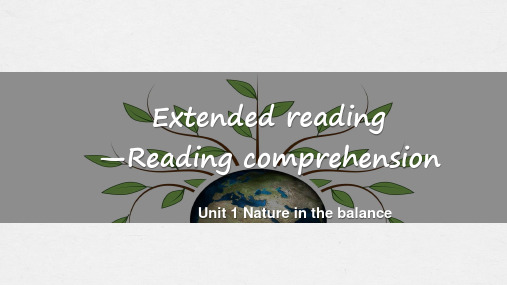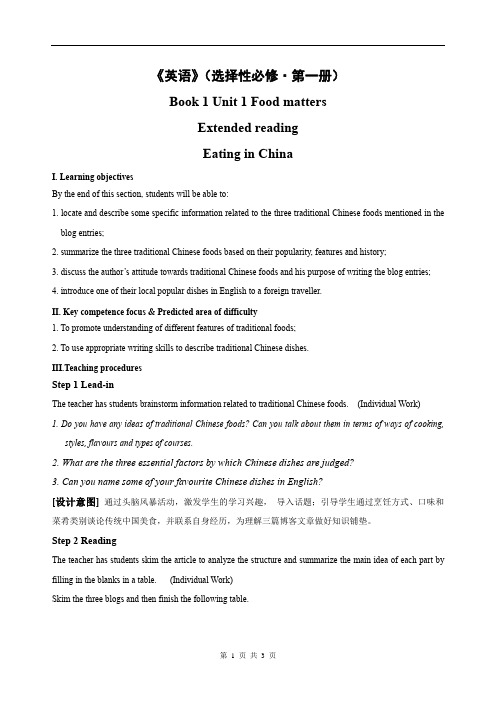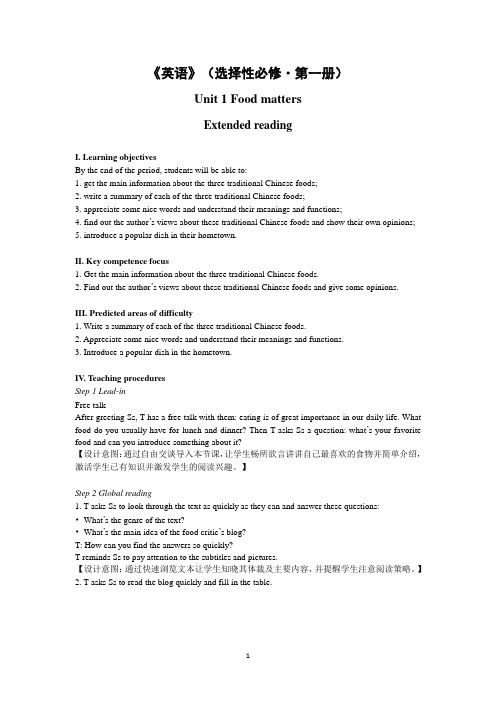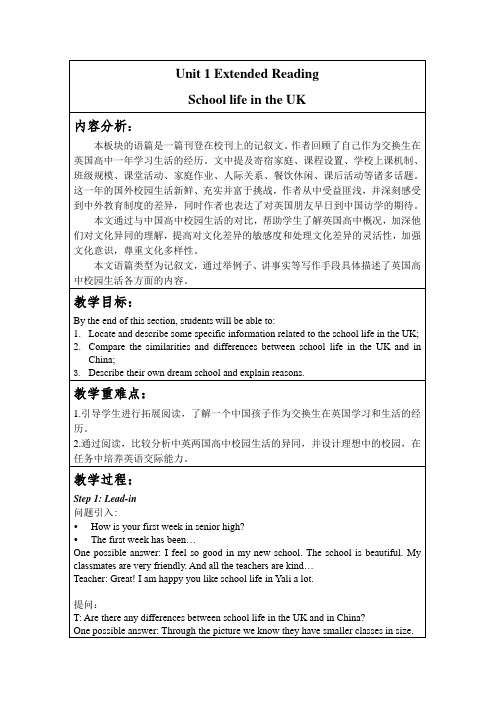高中英语译林牛津新版模块一unit1Extendedreading
Unit1NatureinthebalanceExtendedreading课件高中英语牛津译林版(

to ensure that development strategies are followed in an environmentally friendly way.
√C.Environmental protection is a long-term task that requires joint efforts.
D.There are different viewpoints on environmental pollution.
2. Read the text quickly and match the main idea with each part.
2.What can we learn from Mr Smith’s words?
A.Norgate has always been a polluted city.
√B.He thinks it is heavy industry that has polluted Norgate.
C.Norgate used to be a city where the air wasn’t clean.
Lines 28-45 1. Find out the attitude of Julie Archer.
We have to _a_ch_i_e_v_e_a__b_a_la_n_c_e_ between environmental protection and economic development.
the grass _g_r_e_en___ and CTohme smpoagrinisthoenair has _c_o_lo_r_e_d___the sky
UNIT1BACKTOSCHOOLEXTENDEDREADING课件高一上学期英语牛津译林版

clubs many clubs
school lunch lots of options
timetable 9:00-16:00
What aspects have been talked about in the text?
Who
John Li, a Chinese senior high school student.
Where
A British secondary school.
When
A year ago.
Fast reading
clubs
timetable
What aspects have been talked about in the text?
…
Prediction
timetable
classes/courses
dorms
What aspects might be included in the text?
homework
dinner/supper
lunch
breakfast
Fast reading
What
School life in the UK
school lunch
homework
subjects classes
timetable
The school day of British students starts at
at
4 p..m.
9 a.man.d ends
What about you?
6:50-21:30
subjects
2021牛津译林版高中英语必修一 Unit1 Extended reading教学设计

《英语》(选择性必修·第一册)Book 1 Unit 1 Food mattersExtended readingEating in ChinaI. Learning objectivesBy the end of this section, students will be able to:1. locate and describe some specific information related to the three traditional Chinese foods mentioned in the blog entries;2. summarize the three traditional Chinese foods based on their popularity, features and history;3. discuss the author’s attitude towards traditional Chinese foods and his purpose of writing the blog entries;4. introduce one of their local popular dishes in English to a foreign traveller.II. Key competence focus & Predicted area of difficulty1. To promote understanding of different features of traditional foods;2. To use appropriate writing skills to describe traditional Chinese dishes.III.Teaching proceduresStep 1 Lead-inThe teacher has students brainstorm information related to traditional Chinese foods. (Individual Work)1. Do you have any ideas of traditional Chinese foods? Can you talk about them in terms of ways of cooking,styles, flavours and types of courses.2. What are the three essential factors by which Chinese dishes are judged?3. Can you name some of your favourite Chinese dishes in English?[设计意图] 通过头脑风暴活动,激发学生的学习兴趣,导入话题;引导学生通过烹饪方式、口味和菜肴类别谈论传统中国美食,并联系自身经历,为理解三篇博客文章做好知识铺垫。
Unit1Extendedreading课件-高中英语牛津译林版(2020)

FORREST: Momma says stupid is as stupid does. Jenny puts her hand out toward Forrest. Forrest reaches over and shakes her hand. JENNY: I'm Jenny. FORREST: I'm Forrest. Forrest Gump.FORREST (Voice-over): From that day on, we was always together. Jenny and me was like peas and carrots.
《阿甘正传》是 1994 年由汤姆·汉克斯主演的电影。影片讲述了福雷斯特·冈 普——一个单纯和热心的人的故事。尽管智商只有 75,他的生活却着实精彩。 20 世纪下半叶美国社会发生的一些重大事件,他是亲历者,有几次他还对这些 大事件产生了影响。
重点词汇
Forrest Gump 阿甘正传
starring 主演 ;
重点词汇 Voice-over 配音 ; 旁白 ; young man 年轻人 ; 年轻人 recollects 记得 ; 回忆起 go on 往前走 ; 继续…下去 sweetest 甜的 ; 香的 ; wide world 广阔世界
Take notes quickly!
Forrest looks back at Jenny Curran, a young girl about Forrest's age. FORREST (Voice-over): I had never seen anything so beautiful in my life. She was like an angel. JENNY: Well, are you going to sit down, or aren't you? Forrest sits down next to Jenny. JENNY: What's wrong with your legs? FORREST: Um, nothing at all, thank you. My legs are just fine and dandy. FORREST(Voice-over): I just sat next to her on that bus and had a conversation all the way to school.
牛津译林版(2020)选择性必修一 Unit 1 Extended reading 教案

《英语》(选择性必修·第一册)Unit 1 Food mattersExtended readingI. Learning objectivesBy the end of the period, students will be able to:1. get the main information about the three traditional Chinese foods;2. write a summary of each of the three traditional Chinese foods;3. appreciate some nice words and understand their meanings and functions;4. find out the author’s views about these traditional Chinese foods and show their own opinions;5. introduce a popular dish in their hometown.II. Key competence focus1. Get the main information about the three traditional Chinese foods.2. Find out the author’s views about these traditional Chinese foods and give some opinions.III. Predicted areas of difficulty1. Write a summary of each of the three traditional Chinese foods.2. Appreciate some nice words and understand their meanings and functions.3. Introduce a popular dish in the hometown.IV. Teaching proceduresStep 1 Lead-inFree talkAfter greeting Ss, T has a free talk with them: eating is of great importance in our daily life. What food do you usually have for lunch and dinner? Then T asks Ss a question: what’s your favorite food and can you introduce something about it?【设计意图:通过自由交谈导入本节课,让学生畅所欲言讲讲自己最喜欢的食物并简单介绍,激活学生已有知识并激发学生的阅读兴趣。
Unit 1 Extended reading 课件- 高一下学期英语牛津译林版选择性必修一

有关lncRNA不得不看的十篇综述!不太清楚别人对SCI文章的偏好如何,相比于Research Article,本宫更喜欢看Review,因为Review能给人更加全面的认知,会觉得自己真的涨姿势了!一篇好的综述会让人觉得自己不是在看一篇严肃的科技论文,而是在看一篇散文或者说是博物小品文,能够让人沉浸其中!LncRNA现在辣么火,X湿兄也要开始讲座了,本宫拿出自己珍藏多年的LncRNA综述分享给大家,下面就开始愉悦的阅读之旅吧!1、Unique features of long non-coding RNA biogenesis and function (Nat Rev Genet,2016 Jan)当LncRNA这个曾经基因组中的“暗物质”逐渐为我们所认知,我们意识到自己过去错得有点离谱,基因毕竟是进化了几亿年的老妖精,怎会如此轻易地被我们看透?!这篇综述详细地讲述了有关LncRNA机制研究的最新成果,读完全文,你会对LncRNA的作用机制将会有更全面地领悟。
LncRNA的转录后过程2、Genome regulation by long noncoding RNAs (Annu Rev Biochem. 2012)本文详述了LncRNA对基因组的调节作用。
LncRNA的调节作用可以说是对中心法则的挑战?亦或是补充?总之,非编码RNA的发现让我们在RNA的功能认知上有了全新的视角。
本文最后还提出了对未来LncRNA研究的展望,虽是2012年的展望,但现在看来仍不过时!对RNA生物调节功能的认知时间表3、Long Noncoding RNAs in Cancer Pathways (Cancer Cell. 2016 April 11)这篇综述详述了lncRNA与癌症表型的关系,以及阐述了其中的分子机制和涉及到的信号通路。
文中还详细整理了LncRNA在不同癌症中对基因突变位点的影响、癌症监测诊断中以及预后中的作用。
Unit1 Extended Reading 说课稿-译林牛津高中英语必修第一册

Unit 1 Back to school,Extended Reading .School life in the UK说课稿InterpretationGood morning, ladies and gentlemen. It's a great honor to be here sharing my lesson with you. And I'd like to interpret my teaching plan from six parts: analysis of the teaching material, analysis of the students, the teaching objectives, the teaching and learning methods, the teaching procedures and the board plan.Part 1Analysis of the Teaching MaterialThe content of my lesson is from Yilin Press, Book 1, Unit 1 Back to school,Extended Reading .School life in the UKWhat: This is a reading material for senior 1 students,there are 7 paragraphs altogether.The text talks about a former exchange student' s experience in a secondary school in the UK. There are some aspects of school life in the UK mentioned in the text, such as host family, subjects,class size, homework, relationships, after-class activities and so on. The author benefits a lot from his experience and he deeply feels the difference between Chinese and foreign education systems. At the same time,the author expresses his hope for his British friend Daniel to visit and study in China at an early time.Why: The text is intended to:1. guide students to gain some knowledge about school life in the UK;2.motivate students to deepen their understanding of the author' s attitude towards school life in the UK;3.inspire students to figure out the similarities and differences between school life in the UK and in China.How: The text type is narration, which is developed in details by examples, facts and other writing methods to show some aspects of British high school life. The sentence structure of this article is highlighted by using the titles such as but and however, which effectively highlights the key points and demonstrates rigorous logical thinking.Part 2Analysis of the studentsMy students come from Seniorl, who have learnt English in junior school for 3 years, so they have some knowledge accumulation and a certain reading ability, but when faced with such a long text frying to collect certain information, they may feel a little uneasy. When it comes to school life, they are curious,active and eager to learn, but they may know little about school life in other countries and seldom think about the differences between school life in the UK and in China. Moreover, some of the students are unwilling to express themselves in public, so it is my job to encourage them.Part 3Teaching ObjectivesAfter studying the teaching material and the students, and to meet therequirements of core literacy, the teaching objectives are as follows:By the end of the class, students will be expected to:1.analyse the genre and structure of the text, understand the key information and learn some knowledge of school life in the UK with the help of reading skills of skimming forthe gist and scanning for specific information;2.understand the author' s attitude towards school life in the UK;3.realize the similarities and differences between school life in the UK and in China4.apply what' s been learnt, define their attitudes towards school life in the UKTeaching HighlightsIt's important for the students to understand the genre of the text. And they might have difficulty in defining their own attitudes towards school life in the UK ・, so ril help them by comparing school life in the UK and school life in China.Part 4Teaching Methods and Learning Methods Teaching method:For achieving these teaching objectives, I will use the Communicative teaching method.Learning Methods:Students will learn this lesson through Individual learning and Cooperative learning Teaching ProceduresStep 1 Lead-in. (2mins)I will start my lesson with a question:"Have you ever heard of a school named Eton College?59 Some students may say yes, while some students may say no. And then I will make a brief introduction and play a video about Eton college. After that, I will Ask the students:"What did you see or hear in the video?”And how do you feel? The students can answer the questions freely.The purpose of this step is to arouse students interest in the topic, activate their knowledge of the topic and motivate them to speak in English.Step 2 ReadingPre- reading (4mins)Then comes the reading part. But before their reading, I will ask them to look at the title and predict or guess what aspects about school life in the UK will be talked about today? I will write down the aspects they mention on the blackboard. After that, I will give them several minutes to check whether the aspects are mentioned and also write down the aspects that haven't been mentioned before. Here is a picture of the aspects students mentioned in the real class.(picture)The purpose of this step is to train the students to make predictions and guesswhen reading a text.Step 2 ReadingWhile-reading (14mins)Activity 1 Learning the genre (Individual work, 3mins)Now, it's time for the students to read. I'll ask students to read the text quickly to tell the genre, the structure and some basic information about the text.The purpose of this step is to practice reading skills of skimming and acquire some knowledge about the genre of the text, which will be useful when asked to write a narration by themselves in the following class.Activity 2 Introducing the details (Individual work , 8mins)After knowing some basic information about the text, it's necessary for the students to read the text again to find more detailed information.I will ask students to introduce the aspect(s) they like and share some related information instead of going through the text paragraph by paragraph. In this activity, students not only do reading, but also need to define their own attitudes towards school life, which will be helpful in the following steps of the class.Then, students will be asked to introduce the aspects they like and write down some information they mention briefly on the blackboard.The outcome of the class maybe like this...(picture)The purpose of this step is to help students use integrated skills to learn the text better and define their own attitudes towards school life.Activity 3 Questions (Individual work, 3mins)After that , students will be asked questions about Challenges and Attitudes,the questions are :“What challenges was the writer faced with?How did he overcome them?” and:4C How does the writer feel about his school li fe in the UK?How do you know?”The purpose of my design is to help students get a whole understanding of the situation the author faced and figure out the attitudes the author have towards school life in the UK,which may help define their own attitudes in the follow steps.Step 2 ReadingPost-reading (8mins)To motivate students thinking, I will ask them to compare school life in the UK and school life in China from the aspects: timetable, subjects,classes,homework,school lunch,clubs. There are no standard answers to the questions, so the students can express their opinions freely.The purpose of my design is to help Ss figure out the similarities and differences between school life in the UK and in China,deepen their understanding of the topic and be prepared for the next step of the class.Step 3 Discuss and Report (Group work, 15mins)Here, students finish reading. Today they've learned about some aspects about school life in the UK. Now it's time for the students to share their attitudes. They are expected to discuss in groups of four and talk about aspects they like or dislike about the school life in the UK from the passage ,write down the aspects and reasons on the red notes or green notes.On the red notes are the aspects they like while on the green ones are the aspects they dislike.After that, students will be invited to the front to present their ideas to the class. It is possible to begin like this: “The aspect we like about the school life in the UK is that...because.../The aspect we dislike about the school life in the UK is that...because...After the report, they will be asked to paste the notes on the blackboard.The purpose of my design is to help Ss define their attitudes towards school life in the UK, develop Ss' ability of communication and also train their ability of cooperation and expression.Step 4 Summary and Assignment(2mins )Summary(lmin)After discussion and report, we will conclude what has been learnt today, like the genre, the structure,the aspects and the comparison. And I will mention that there are some aspects that are not mentioned in the text, so it is their job to find more information about the aspects and share with each other in the following class.The purpose of my design is: to summarize the essence of the text and get students prepared for the next class.Assignments(lmin)At the end of the class, the following homework will be assigned:1.Find more information about other aspects of school life in the UK;2.Think about what their dream school is like and be prepared to talk about it in the following class.The purpose of homework is to inspire students to acquire more knowledge about other aspects about school life by themselves.Part 6 Board PlanThe board plan is as what is shown on the screen.That's all for my presentation of the teaching plan. Thanks fbr your attention.。
译林版高中英语必修一Unit1 Extended Reading 教案(雅礼)

T: Are there any other differences between school life in the UK and in China? Students watch different slides in the PPT and their answers vary.Step 2: Fast ReadingHave students read the article and answer the following questions.•What is the school life like as an exchange student in the UK?•What aspects might be introduced?Listen and check the aspects mentioned.Step 3: Detailed ReadingListen to the recording of the text and decide whether the following statements are true or false by discussing:1. I stayed in Britain with a host family whose son is called David.2. The host family were friendly to me and we got on very well.3. The British school day starts at 8:00 am and finishes at 5:00 pm.4. There are about 50 students in each class in British school.5. I found Math quite challenging because the material was more advanced in the UK than in China.6. I couldn’t make much contribution in class discussion because I was too shy.7. There were lots of options in the dining hall.8. The club that most interested me was basketball club.Answers: F, T, F, F, F, F, T, F.Read the text carefully and answer these questions.1. What challenges did John come across?2. How did he overcome them?Possible answer:1. He wasn’t able to express himself clearly in English.2. Fortunately, his teachers and classmates were always helpful and gave him a lot of encouragement. His language skills improved over time.Further readingHow does John like the school life in the UK?Possible answer: He is glad to have the opportunity to experience this different way of life.Step 4:Understanding the textWhat is the type of the article, a narration, an argumentation, or an exposition? Answer: A narration is a story or account of events.Analyze the structure of the narrationStep 5:SummarySummarize the main idea of the article with about 50 words.Requirement: Include those 5 elements in your summary: who, when, what, where, how.Possible answer:John Li, who studied at a British secondary school as an exchange student a year ago, introduces to us different aspects of the school life in the UK, including timetable, subjects, classes and so on. He also talks about the challenges he faced and feels glad to experience the life.Step 6:Free talkWhat is your dream school like?Requirement:•Include at least 2 of the aspects talked about in this period.•List some qualities you expect from the students and teachers.。
- 1、下载文档前请自行甄别文档内容的完整性,平台不提供额外的编辑、内容补充、找答案等附加服务。
- 2、"仅部分预览"的文档,不可在线预览部分如存在完整性等问题,可反馈申请退款(可完整预览的文档不适用该条件!)。
- 3、如文档侵犯您的权益,请联系客服反馈,我们会尽快为您处理(人工客服工作时间:9:00-18:30)。
高中英语译林牛津新版模块一unit1Extendedreading
Unit 1 Back to school
Extended reading
School life in the UK
Last year, I had the chance to study at a British secondary school as an exchange student. I stayed with a lovely host family and went to school with their son, Daniel. We were both in year ten and we got on well. He is learning Chinese and will come to stay with me this year in China!
The British school day begins at 9 a.m. and ends at 4 p.m. Students usually have to learn nine subjects at secondary school. Every student in the UK must study English, Maths and the Science subjects: Biology, Chemistry and Physics. Students can also choose to study other subjects, such as History, Art and Business.
The classes are different from those in China. Each teacher has their own classroom and the students move around for every lesson. In most of my classes, there were only about 20 students. In the beginning, however, it was still tough for me to remember everyone’s name!
I enjoyed most of the classes, but some of them were quite challenging. Technology classes were fun. I made a clock to take home. The teacher helped me put the parts together. I like it so much that I still use it as my alarm! I found Maths quite easy and enjoyable because the material was less advanced in the UK than in China.
However, learning in English was a great challenge for me. There were a lot of difficult English words, especially in Geography and Biology. Class discussion is very important in the
UK, but I could not make much of a contribution because sometimes I wasn’t able to exp ress myself clearly in English. Although there was not as much homework as I was used to, it was still challenging. Fortunately, my teachers and classmates were always helpful and gave me lots of encouragement.My language skills improved over time.
During the hour-long lunchtime, I ate in the school dining hall. There were lots of options including bread and butter, chicken pie and puddings, but I still missed my mum’s cooking! After lunch, I often played on the school’s huge sports field with Daniel and his friends. Sometimes we just relaxed under a tree or sat on the grass. After school, there were many clubs to join. The one that attracted me most was the Rugby Club. We played once a week, and it was really fun. Also, I enjoyed acting in the Theatre Club. I still have photos of myself acting in William Shakespeare’s A Midsummer Night’s Dream. Joining clubs was a great way to meet British students and make friends with them.
I am glad to have the opportunity to experience this different way of life. I met some great people and learnt a lot about school life in the UK. Daniel and his family were fantastic hosts, and his friends were very nice as well. I c an’t wait for Daniel to visit China!。
